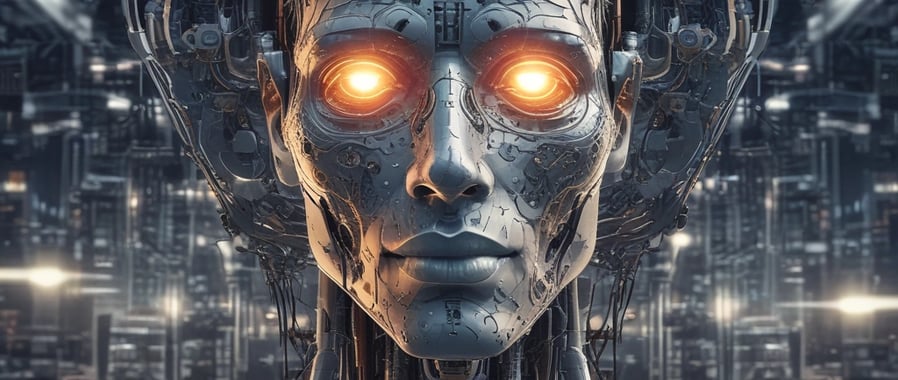Artificial Intelligence in 2025: Transforming Everyday American Life
What is Artificial Intelligence and its Development until 2025
5/8/20245 min read
AlphaBites
Men around the world are rediscovering their power and surprising their partners with much more energy in the room.


Artificial intelligence (AI) is a branch of computer science that aims to create systems capable of simulating human intelligence. This includes performing complex tasks such as speech recognition, decision-making, and problem-solving. Over the decades, the evolution of AI has seen a number of significant milestones, beginning in the 1950s, when researchers began exploring the idea of machines that could learn and reason. Since then, AI development has advanced at a rapid pace, resulting in innovations that have profound impacts on everyday life.
One of the most significant advances is in machine learning, a sub-area of AI that uses algorithms to analyze data and improve its performance over time. The popularization of large volumes of data and the increase in computing power have contributed to the strengthening of deep learning techniques. Research from renowned institutions such as MIT and Harvard has demonstrated the potential of machine learning in transforming several industries, such as healthcare, finance and transportation.
Another important aspect of the evolution of AI is the development of robotics and virtual assistants. In recent years, AI-powered personal assistants such as Siri and Alexa have become commonplace in people’s daily lives. These assistants are designed to make simple tasks easier, from answering questions to controlling devices in smart homes. With the advancement of natural language processing techniques, these assistants are expected to become even more powerful and integrated into our lives by 2025, providing a more personalized and intuitive experience.
As we continue to explore the capabilities of artificial intelligence, it is clear that its evolution transcends simple technological innovations, shaping the way we interact with the world and redefining the concept of intelligence in modern society.
What's New in Artificial Intelligence for 2025
À medida que nos aproximamos de 2025, a inteligência artificial (IA) está prevista para trazer inovações significativas que transformam a vida cotidiana na América. Várias aplicações emergentes demonstram o potencial da IA para otimizar diversos setores, incluindo saúde, transporte, educação e entretenimento. Essas inovações prometem não apenas melhorar a eficiência, mas também revolucionar os modos tradicionais de operação, impactando diretamente a rotina da população.
As we approach 2025, artificial intelligence (AI) is set to bring significant innovations that transform everyday life in America. Several emerging applications demonstrate AI’s potential to streamline a variety of industries, including healthcare, transportation, education, and entertainment. These innovations promise to not only improve efficiency but also revolutionize traditional modes of operation, directly impacting people’s daily lives.
In terms of transportation, innovation in autonomous vehicles is in the spotlight, with American cities expected to adopt this technology more widely. Self-driving cars and drones promise to not only reduce traffic congestion but also improve road safety. AI will be key to optimizing routes and ensuring the most efficient delivery of materials and products.
Education will also be impacted by innovations in AI, which will allow for personalized learning content to meet individual student needs. With the help of virtual assistants and AI platforms, educators will be able to deliver a more engaging and adaptive learning experience, promoting inclusion and increasing knowledge retention.
Finally, in the entertainment sector, AI will enable the creation of personalized experiences in real time, influencing everything from gaming to content production. The ability to tailor entertainment to users’ preferences will foster a new level of interaction and immersion, making free time even more enjoyable.
These innovations in artificial intelligence have the potential to radically transform everyday life in the United States, offering innovative solutions to existing challenges and enabling more efficient and connected habits.
Changes in the Daily Life of Americans
Innovations in artificial intelligence (AI) are becoming a driving force that is changing the daily lives of Americans in significant and multifaceted ways. Notable among these transformations are smart homes, which incorporate virtual assistance to streamline everyday tasks such as energy management, security, and entertainment. Connected devices such as smart thermostats and automated lighting systems not only improve energy efficiency but also promote a more convenient and sustainable lifestyle.
In addition to home comfort, urban mobility is undergoing a process of reconfiguration due to the advent of autonomous vehicles. This technology promises not only to reduce congestion but also to increase road safety, as AI can more efficiently calculate and minimize risks than a human driver. The impact of these innovations is palpable, with several American cities already testing fleets of autonomous taxis and buses, offering citizens a new form of transportation that reduces their reliance on personal vehicles.
Another practical aspect of the transformation brought about by AI is automation in the workplace. Profound changes in the way tasks are performed are being observed, from customer service platforms that use chatbots to industrial production processes that incorporate advanced robotics. In this context, human-machine interaction is becoming increasingly common, creating an environment that prioritizes efficiency and productivity.
As a result of these implementations, not only are everyday activities being reshaped, but also the perception of how technology can integrate into daily life. With these advances, the American population is on a path of continuous adaptation, benefiting from improvements in quality of life and functional efficiency. These changes are a testament to the potential of artificial intelligence, reflecting a future that is taking shape under the influence of this innovative technology.
Impacts on Traditional Tasks and the Future of Work
The growing adoption of artificial intelligence (AI) and automation has led to significant changes in traditional day-to-day tasks in the workplace. As these technologies become more integrated into organizational processes, we are witnessing a shift in the profile of jobs. Some routine functions that previously required human labor can now be performed by algorithms and machines. This transition promises to not only change roles, but also reconfigure the dynamics of the American workforce.
One of the main challenges arising from this technological evolution is the displacement of jobs. Jobs involving repetitive and manual tasks are particularly at risk, as automation can perform these activities more efficiently and without errors. However, this situation also opens the way for the emergence of new professions, especially in the areas of programming, systems maintenance and data analysis. In this scenario, professional reskilling becomes an urgent need. Workers will need to adapt and develop new skills that are compatible with the demands of the future job market.
Despite concerns about automation, it is vital to recognize the benefits that technology can bring to operational efficiency. Artificial intelligence can take over repetitive and routine tasks, freeing workers to focus on activities that require creativity and critical thinking. This not only increases productivity, but also fosters a more dynamic and innovative work environment.
To prepare for these new challenges, Americans must embrace lifelong learning and education in technology fields. Investing in education and training in digital skills is essential to ensuring that workers are competitive in the ever-evolving job market. In this way, the combination of reskilling and adaptation can foster a more inclusive and sustainable future of work.
AlphaBites
Men around the world are rediscovering their power and surprising their partners with much more energy in the room.
